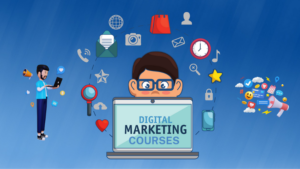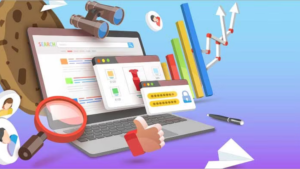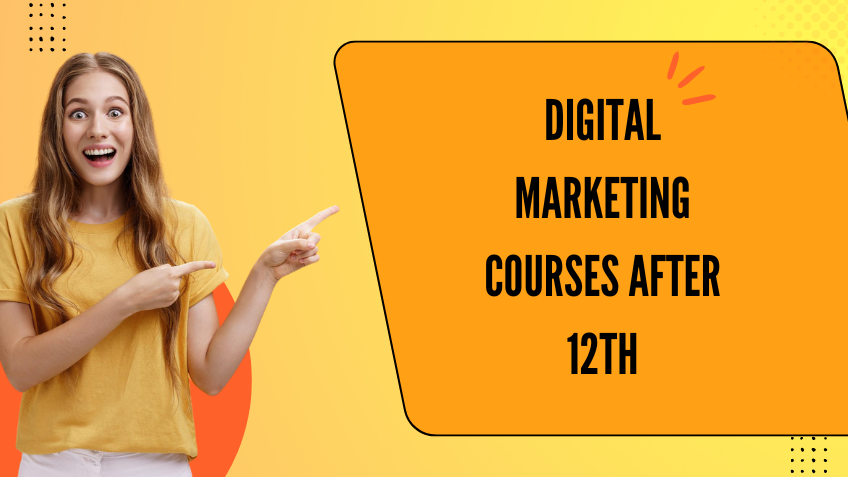Digital marketing courses after 12th
In today’s digital marketing courses after 12th, businesses are increasingly turning to online platforms to reach their customers. This has created a high demand for digital marketing professionals who can help companies connect with their audience efficiently. If you’ve just completed 12th grade and are looking for a career combining originality with technology, a digital marketing course strength is the perfect choice for you. Digital marketing involves promoting products or services through various online channels like social media, search engines, and email. It’s an exciting field that offers many career opportunities, from managing social media accounts to creating beautiful online content.
This guide will discover the digital marketing courses available for students after 12th grade. Whether you’re interested in certification programs, diploma courses, or online training, we’ll help you find the best option to kick-start your career in digital marketing.
Why It’s Important:
Understanding the effectiveness of marketing efforts helps businesses make informed decisions, optimize their strategies, and achieve better results. These roles each play a vital part in a digital marketing team, contributing to the overall success of online marketing efforts. Whether you’re interested in optimizing search engine rankings, managing and creating engaging content, handling paid social media ads, or analyzing data, there’s a place for you in digital marketing.

Why Choose Digital Marketing?
Digital marketing is a lively and adaptable field. It offers many career opportunities, from social media management to SEO specialization.
Here are some reasons why you should consider a career in digital marketing:
High Demand for Professionals
The digital marketing industry is repeatedly expanding, leading to a surge in demand for professionals. Companies need experts who can find the complexities of online marketing and force business growth.
Attractive Salaries
Digital marketing professionals often enjoy forceful salaries. With the right experience and skills, you can wait for considerable financial rewards.
Flexibility and Creativity
Digital marketing offers a mix of technical and creative skills. Whether you’re inclined towards data analysis, plan development, or content creation, there’s a niche for everyone.
Fast Career Growth
The field of digital marketing is ever-evolving. Staying updated with the newest technologies and trends can help your career progression, offering numerous opportunities for advancement.

Why Choose a Digital Marketing Course After the 12th?
Growing Demand: The need for digital marketing experts is fast increasing. As more businesses focus on online platforms, they require skilled professionals to help them reach out to their customers. This means job opportunities at Opistan universities are abundant in the digital marketing field.
varied Career Opportunities: Digital marketing offers a variety of roles, each with its unique responsibilities. You can become an SEO specialist who helps websites rank higher on search engines, a social media manager who handles engagement and posts on platforms like Facebook and Instagram, a content creator who produces useful and attractive content, or a digital marketing analyst who studies data to improve marketing strategy.
Creativity and Flexibility: Working in digital marketing means you can discover different industries, from fashion to technology. It also allows you to be creative, as you’ll design strategies and campaigns that grab people’s connections and attention effectively.
Good Earning Potential: A career in digital marketing can be financially rewarding. Skilled professionals in this field often enjoy good salaries and have opportunities for career growth. Your earning potential can increase considerably as you gain more expertise and experience.
Types of Digital Marketing Courses
Certification Courses:
- Duration: Typically 3 to 6 months
- Content: Focuses on fundamental skills and tools in digital marketing.
- Examples: Google Digital Garage, local institutes, and HubSpot Academy,
Diploma Courses:
- Duration: 6 to 12 months
- Content: Provides a deeper understanding of digital marketing tools and strategy.
- Examples: Diploma in Digital Marketing from different institutes.
Degree Courses:
- Duration: 3 years (Bachelor’s) or 1-2 years (Master’s)
- Content: complete programs covering advanced management and digital marketing techniques.
- Examples: BBA/BCom specializing in Digital Marketing, MBA in Digital Marketing.
Online Courses:
- Duration: Flexible, depending on the provider
- Content: Self-paced learning covering all aspects of digital marketing.
- Examples: Udemy, and LinkedIn Learning, Coursera, .
Workshops and Internships:
- Duration: Varies
- Content: Practical experience and hands-on training in digital marketing.
- Examples: Internships with digital marketing agencies & workshops organized by industry experts.

How to Choose the Right Digital Marketing Course
Choosing the right digital marketing course is critical for a successful career in this dynamic field. With many options available, it’s necessary to consider numerous factors to ensure that the course you select meets your needs and helps you attain your career goals.
Here’s a detailed guide to help you make an informed decision:
- Reputation and Accreditation
When selecting a digital marketing course, choosing one offered by a recognized institution or that holds official approval from an applicable power is vital. Accredited courses are often endorsed by industry professionals and educational bodies, ensuring the content is up-to-date and meets industry standards. A reputable institution enhances your qualifications and credibility and can positively impact your job prospects.
How to Check:
- Research the Institution: Look up the institution offering the course to ensure it has a good track record and is known for delivering quality education.
- Verify Accreditation: Check if the course has accreditation from recognized industry educational authorities or bodies. This information is usually available on the course provider’s website.
- Seek Recommendations: Ask for recommendations from professionals in the field or check online reviews to measure the standing of the course provider.
- Course Content
The content of the digital marketing course should be complete and cover all necessary aspects of the field. It should align with your career goals and provide you with the skills needed to excel in the industry. Look for courses that include modules on key topics such as PPC, social media marketing, SEO, email marketing, content marketing, and data analytics.

How to Evaluate:
- Review the Syllabus: Obtain a detailed course or syllabus outline to ensure it covers all applicable topics. This information is often available on the course provider’s website or upon request.
- Check for Updates: Digital marketing is a fast-evolving field. Ensure the course content is current and includes the newest techniques and tools.
- Understand the Depth: Assess whether the course provides a broad overview or in-depth knowledge of each topic. Depending on your career goals, you might need a course that offers more particular training.
Faculty Experience
The qualifications and experience of the faculty members play an important role in the quality of the course. Experienced instructors with industry know-how can provide valuable insight, practical knowledge, and real-world examples that improve the learning experience.

How to Assess:
- Review Faculty Profiles: Look for information about the instructors, including their qualifications, professional experience, and areas of expertise.
- Check for Industry Experience: Instructors with hands-on experience in digital marketing can offer practical guidance and insights beyond theoretical knowledge.
- Seek Student Feedback: Testimonials or read reviews about the faculty to understand their teaching efficiency and aptitude to connect students.
Duration and Cost
The duration and cost of the course are practical considerations that can impact your decision. Ensure the course fits within your budget and the duration aligns with your availability and goals.
How to Evaluate:
- Compare Costs: Research the fees of different courses and determine what is included in the price (e.g., materials, access to tools, etc.).
- Consider Duration: Check the duration of the course to make sure it fits with your schedule. Some courses may offer part-time options or flexible schedules to contain working professionals.
- Look for Financial Aid: examine if the course provider offers any financial aid, scholarships, or payment plans to help direct the cost.
Testimonials and Student Reviews
Feedback from earlier students can provide valuable insights into the course’s efficacy. Reviews and testimonials can expose the weaknesses and strengths of the program and help you measure whether it meets the expectations set by the course provider.
How to Research:
- Read Online Reviews: Look for reviews on educational platforms, social media, or forums where students share their experiences.
- Ask for Testimonials: Request testimonials from past students or contact alums for their feedback on the course.
- Join Online Communities: Participate in groups or online communities related to digital marketing to get opinions and recommendations from others in the field.
Career Opportunities After Completing a Digital Marketing Course
Digital marketing is a diverse field with various career opportunities.
Here’s a closer look at some of the key roles you can follow:
SEO Specialist
What They Do: An SEO Specialist focuses on civilizing a
website’s visibility on search engines like Google. They aim to ensure the website appears higher in search results when people look for applicable terms.
Key Responsibilities:
Keyword Research: Finding the right keywords to target that potential customers are searching for.
On-Page Optimization: Make changes to the website’s content and structure to improve its ranking.
Link Building: Getting other websites to link back to the site to increase its power.
Monitoring Performance: Using tools to track the site’s ranking and traffic and adjusting as needed.
Why It’s Important: Higher search engine rankings lead to more natural traffic, generating more potential customers to find your site without paying for ads.
Social Media Manager
What They Do: A Social Media Manager manages and creates a company’s presence on social media platforms like Instagram, Twitter, Facebook, and LinkedIn. They work to connect and build with the brand’s promotion and audience efficiently.
Key Responsibilities:
Plan Development: Creating social media plans that line up with business goals.
Content Creation: Designing posts, graphics, and videos to share on social media.
Engagement: Responding to comments and messages and interacting with followers.
Analytics: Tracking the performance of social media campaigns & adjusting strategy based on results.
Why It’s Important:
Social media is a powerful tool for building awareness, attractive to customers, and driving traffic to the website.

Content Marketer
What They Do: A Content Marketer focuses on creating and
managing content that attracts and retains customers. This includes articles, videos, blog posts, infographics, and other types of content.
Key Responsibilities:
Content Strategy: Planning what content to create and how it will be dispersed.
Content Creation: Writing, editing, and producing valuable content applicable to the target audience.
Distribution: Sharing content through social media, email, and the website.
Performance Tracking: Analyzing how well the content is making improvements and performing.
Why It’s Important:
High-quality content helps build trust, provides value to the audience, and drives traffic to the website. It’s a key part of attracting and engaging customers.
PPC Specialist
What They Do: A PPC (Pay-Per-Click) Specialist manages paid
advertising campaigns on social media and Google Ads. They create ads that appear when users search for exact keywords or fit certain Criteria.
Key Responsibilities:
Campaign Setup: Creating & launching PPC ads to reach targeted audiences.
Budget Management: Allocating and managing each campaign’s budget to ensure cost-effectiveness.
Ad Optimization: Testing and changing ads to increase clicks and performance.
Performance Analysis:
Monitoring the results of campaigns and adjusting strategies to improve ROI (Return on Investment).
Why It’s Important: PPC advertising provides immediate visibility and can drive targeted traffic to the website, making it a valuable tool for generating sales and leads.

Digital Marketing Analyst
What They Do: A Digital Marketing Analyst examines data and
metrics from marketing campaigns to understand what’s working and what’s not. They provide recommendations and insights based on their analysis.
Key Responsibilities:
Data Collection: meeting data from different marketing tools and channels.
Performance Analysis: Reviewing metrics like conversion rates, website traffic, and campaign results.
Reporting: Creating reports to share insight and findings with the team.
Plan Improvement: Using data to suggest changes and improvements to marketing strategy.
Conclusion
Digital marketing course in Chandigarh offers a dynamic and satisfying career path, particularly for students finishing their 12th grade. With businesses’ increasing dependence on online platforms, skilled digital marketers are in high demand. Choosing the right digital marketing course can set you on the path to a successful career, offering varied opportunities in social media, PPC, content creation, SEO, and analytics. In Chandigarh, different courses are available, from diplomas and certifications to online programs and workshops. Each type of course provides single benefits, whether you’re looking for foundational, advanced or knowledge skills.
By investing time in a digital marketing course, you can provide yourself with the necessary tools and expertise to flourish in this exciting field. Explore your options, align your choice with your career goals, and take the first step toward a fulfilling career in digital marketing.
